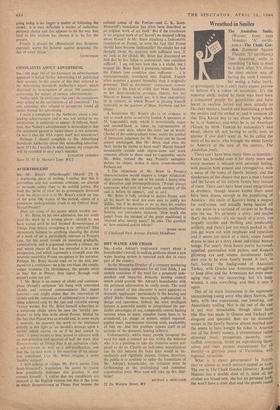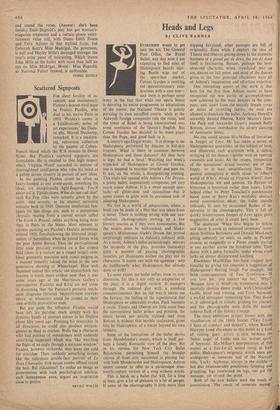Wreathed in Smiles
The Anatolian Smile.
(Warner, from next
Monday; 'A' certifi- cate.)—The Chalk Gar- den. (Leicester Square Theatre; 'U' certificate.) THE Anatolian smile is something I'd hate to meet in a dark alley. It's about the most sinister way of baring the teeth I remem- ber seeing, a Judas smirk, so grotesquely false it can't really expect anyone to believe it's a token of. amiability. It's the minority smile, smiled by those who have been a conquered people for generations and have learnt to swallow hatred and seem actually to like their masters, hateful and humiliating to both the smilers and the smiled at; and it conjures all that Elia Kazan has to say about being where he is, in America, and what he is, an American ('Greek by birth, Turkish by nationality'), and about, above all, not having to smile, ever, at anyone if you don't want to. So he called the story of his uncle, who brought the whole family to America at the turn of the century. The Anatolian Smile.
There can't have been many films as heartfelt: Kazan has brooded over it for thirty years and every moment is infused with personal feeling, with passion both present and retrospective, with a sense of the irony of family history, and the slenderness of the chance that puts a man's future and the future of his unborn family here instead of there. There can't have been many emigrations as dramatic, though heaven knows there must have been drama enough in the populating of America : this uncle of Kazan's being a magnet for misfortune, and actually being hauled off at one point in a cartload of corpses to be flung into the sea. It's certainly a story; and maybe that's the trouble—it's too much of a story, too turgidly terrible and thrilling acid predictably unlikely, and there's just too much packed in, till you get worn out with emphasis and repetition and it seems too much of a thick, soupy family drama to take as a story about individual human beings. For nearly three hours you're harrowed, appalled, pummelled with pathos, and Kazan's glittering eye and intense involvement fairly dare you to be even faintly bored. It isn't, in fact, boring: the background of Anatolian Turkey, with Greeks and Armenians struggling to keep alive and the Armenians not even man- aging that, is too interesting; but it's long- winded, it says everything, and then it says it again. One of its main limitations is the supremely uninteresting young actor who plays Stavros, the hero, with two expressions, one lowering, one Anatolianly smiling. Nor is the rest of the cast in any way, remarkable, though silent faces (the film was made in Greece and Turkey) are eloquent and splendid. Best are the domestic scenes in the family Stavros almost married into (he seems to have bought his ticket to America out of the dowry money, a circumstance rather skimmed over), prosperous, paunchy, over- stuffed, overeating, intent on reproducing thenv selves and . their present contentment for all eternity—a glorious piece of Victoriana, with regional variations. What is it about governesses? In fiction, they've almost as much mystery-appeal as nuns. The one in The Chalk Garden (director: Ronald Neame) has a double dose of it, since all her clothes are brand-new, she has no personal junk, she won't have a door shut and she prowls round and round the room. (Answer: she's been Inside.) Enid Bagnold's play has got woman's- magazine treatment and a certain glossy enter- tainment value still, with Dame Edith Evans and Felix Aylmer in fine stylised form; but Deborah Kerr's Miss Madrigal, the governess, is null and Hayley Mills's deranged teenager the year's prize piece of miscasting. Which leaves John Mills as the butler with more than half an eye on Miss Madrigal. Moral: Miss Bagnold, as National Velvet showed, is unfllmable.
ISABEL QUIGLY







































 Previous page
Previous page